#parliament budget session
Text
Budget 2020: बजट में इस्तेमाल होने वाले इन 10 शब्दावलियों के बारे में कितना जानते हैं आप?
Budget 2020: बजट में इस्तेमाल होने वाले इन 10 शब्दावलियों के बारे में कितना जानते हैं आप?
आज से चंद दिनों बाद यानी 1 फरवरी को वित्त मंत्री निर्मला सीतारमण अपना दूसरा बजट (Budget 2020-21) पेश करने वाली हैं। इस बजट पर पूरे देश की नजर होगी। वित्त मंत्री निर्मला सीतारमण बजट में अर्थव्यवस्था को रफ्तार देने के लिए कई घोषणाएं कर सकती हैं। वित्तमंत्री के पिटारे से क्या-क्या निकलेगा ये तो 1 फरवरी को ही पता चलेगा, लेकिन बजट की कुछ ऐसी शब्दावलियां हैं जिन्हें आपको जानना जरूरी है। आइए जानें 10…
View On WordPress
# union budget 2020#1 February#1 फरवरी#Annual Financial Report#budget#budget 2020 analysis#budget 2020 date India#budget 2020 expectations#budget 2020 expectations India#Budget 2020 Highlights#budget 2020 income tax#budget 2020 india#budget 2020 key points#Budget 2020 News#budget 2020 predictions#budget analysis#Budget news#budget report#budget session 2020#budget session 2020 parliament#budget speech#budget updates#Consolidated Fund of India#Contingency Fund#Deduction Proposal#Finance Budget#finance minister#fiscal deficit#FM Nirmala Sitharaman#General Budget
0 notes
Photo

(24/54) “One afternoon the empress and prince attended a session of parliament. It was an important day. Everyone was hoping to make a strong impression, and I’d prepared a speech especially for the occasion. I was the last speaker on the schedule. The Speaker of Parliament saw me approaching the podium and tried to wave me off. When I kept coming, he hurriedly adjourned the session. I think some of my colleagues viewed me as an annoyance. I’d developed a reputation for speaking my mind. And whenever I could speak, I spoke. I gave a speech on every budget, every proposal, every vote. The topic was always different. But the theme was always the same: 𝘋𝘢𝘢𝘥. Justice. The word that appears most in Shahnameh. Everyone gets what they deserve. One day I gave a speech saying I’d been informed that Iran’s highest-ranking admiral had used a battleship to import Italian furniture. I asked how we could allow such corruption, from a man with a breast full of public service medals. The crowd was silent. It was unheard of to criticize the military, because it was in the hands of the king. But I wanted to show that I was not afraid to speak. So that other Iranians would feel free to share their thoughts. My words were never heard in the media. If there was ever a mention in the newspaper, it would only say: the representative from Nahavand gave a speech. But still, I spoke. I always had hope that I’d find a way to be heard. There is an Iranian proverb about ‘words that fly.’ It says that if words are false, if they are self-serving, if they come from ambition: they will never fly. Even if they’re shouted from loudspeakers. Even if everyone says them at the exact same time: they will soon be forgotten. For they have no soul. They have no 𝘫𝘢𝘢𝘯. But if a person can find the right words. If the words have 𝘢𝘩𝘢𝘯𝘨, if the words have 𝘬𝘩𝘦𝘳𝘢𝘥, if the words have 𝘳𝘢𝘴𝘵𝘪- they will grow wings. And they will fly. Even if they’re censored; they will fly. Even if they are silenced; they will fly. Even if they are buried deep in the ground; they will still fly. And they will reach the doorstep of every household.”
بعد از ظهر شهبانو و شاهزاده به نشست مجلس آمده بودند. روز مهمی بود. بودجهی سال آینده در مجلس بررسی میشد. نمایندگان رسانهها برای گزارش این رخداد دعوت شده بودند. من شب پیش در رویارویی با نخست وزیر در زمینهی قانون «از کجا آوردهای» بگو مگو داشتم. در آنجا سخنان تندی میان ما رد و بدل شده بود. رئیس مجلس ترسیده بود که من در هنگام بررسی لایحهی بودجه آنها را به میان آورم. هنگامی که نمایندهای دیگر را در حال بازگو کردن سخنانم در مجلس دیدم، شگفتزده شدم. سخنران بعدی من بودم. برخاستم تا به سوی تریبون بروم که رئیس مجلس پیشنهاد کفایت مذاکرات داد و جلسه پایان یافت. مرا به رُکگویی میشناختند. بیشتر نمایندگان به رویدادهای محلی میپرداختند. من همواره دربارهی اولویتهای ملی سخن میگفتم. در رابطه با هر بودجهای، هر پیشنهادی و هر رأیگیری سخنرانی میکردم. زمینهها متفاوت ولی بُنمایه همیشه یکسان بود: دادگری. واژهای که بسیار در شاهنامه آمده است. همه، آنچه را که شایستهی آنند دریافت میکنند. باری در یک سخنرانی گفتم باخبر شدهام که دریاسالار، فرمانده نیروی دریایی از ناو جنگی برای وارد کردن اسباب و اثاثیه خانهاش از ایتالیا استفاده کرده است. پرسیدم چگونه میتوانیم چنین فسادی را برتابیم، و آن هم از مردی با سینهای پر از نشانهای افتخار. همه ساکت بودند. انتقاد از نیروهای نظامی امری کاملاً ناشناخته بود، زیرا آنها برگزیدهی شاه بودند. من میخواستم نشان دهم که از بیان راستیها بیمی نباید داشت. شاید دیگران نیز چنین کنند. آن فرمانده برکنار شد. کشور را نیکخواهی مردمانش پیش میبرد و نیازمند مسئولیتپذیری دلیرانه است. سخنان من هرگز در رسانهها بازتاب داده نمیشد. اگر هم در روزنامه اشارهای به آن میشد، تنها گفته میشد: نمایندهی نهاوند سخنرانی کرد. ولی من کار خود را میکردم. همیشه امیدوار بودم که راهی برای شنیده شدن پیدا کنم. پندواژهای دربارهی «سخنانی که پرواز میکنند» وجود دارد که میگوید اگر سخنان دروغ باشند، اگر خودخواهانه باشند، اگر آزمندانه باشند، هرگز پرواز نخواهند کرد، حتا اگر از بلندگوها فریاد زده شوند. حتا اگر همه در یک آن آنها را بیان کنند، بزودی فراموش میشوند زیرا جان ندارند. ولی اگر کسی واژههای مناسبی پیدا کند، سخنانی آهنگین، خردمندانه و راستین، بال خواهند گشود و پرواز خواهند کرد. حتا اگر از شنیده شدنشان جلوگیری شود، پرواز میکنند. حتا اگر گویندگانشان را خاموش کنند، پرواز میکنند. حتا اگر در ژرفای زمین فرو برند، همچنان پرواز میکنند و به در هر خانهای میرسند
172 notes
·
View notes
Text
Two top PiS politicians, one of them the former interior minister, are jailed, in what could become a major battleground for the former ruling party as it attempts to force early elections.
On Wednesday morning, the former Polish interior minister Mariusz Kaminski and his ex-deputy, Maciej Wasik, woke up in prison in eastern Warsaw after the police had spent the better part of the previous day trying to arrest the duo to serve sentences for crimes they have already been found guilty of, but for which the opposition claim they should not be imprisoned.
On Tuesday, the police tried to implement a court order to arrest the two Law and Justice (PiS) politicians, who were sentenced in December 2023 to two years in prison for abuse of power committed in 2007 while running the Central Anti-Corruption Bureau (CBA), but the move turned into something out of a political thriller.
With PiS politicians protesting the arrest warrants, and Kaminski and Wasik themselves arguing they are “political prisoners”, the PiS-allied President Andrzej Duda invited the two to a ceremony at the Presidential Palace, taking photos with them as police officers were busy searching their homes in another part of the Polish capital.
Kaminski and Wasik ended up spending the whole day at the Presidential Palace. And it was only in the evening, at around 19:30, that the police decided to enter the palace and arrest the two.
Duda and his supporters point to the fact that the two politicians were pardoned by the president shortly after the populist-conservative PiS came to power in 2015. However, the Supreme Court, the new government that won the October election and legal experts argue that the president’s act has no legal consequences, as the original 2015 court ruling had not yet been made final (only the December 2023 ruling was final).
This is one of several flashpoints many had foreseen when the alliance of three opposition parties won Poland’s October 15 general election and promised to reverse many of what opponents regard as PiS’s anti-democratic policies.
The stakes for the PiS camp and Poland could not be higher. On the one hand, with the new government setting up three separate parliamentary commissions to investigate potential abuses by the previous PiS government – including the use of the Pegasus surveillance software to spy on political opponents – many of its politicians fear going to jail themselves eventually. More immediately, observers are warning that PiS could try to use the arrests of Kaminski and Wasik to force an early election just months after it lost the previous one.
‘Political prisoners’
Kaminski and Wasik were elected to parliament on the PiS list in the October general election, but in December the two politicians were convicted for orchestrating a scheme, including the use of intelligence agents and falsifying of documents, designed to bring down a political opponent. The two argued they were “fighting corruption”; the judge ruled the means used were illegal. The sentence is final.
Szymon Holownia, the marshal of the Sejm, declared their mandates were invalidated by the court ruling and terminated their voting privileges. However, PiS insists the two should remain in parliament and can vote.
A chamber of the Supreme Court ruled on Wednesday that Kaminski was indeed no longer an MP after Kaminski had appealed Holownia’s decision.
Kaminski and Wasik themselves had announced their intention to vote during a new parliamentary session that was set to begin on Wednesday, but which Holownia has since postponed to next week.
Crucially, parliament has to vote on a new budget in this coming session, and the new government has only until the end of January to bring the budget to President Duda for approval. Duda, who cannot veto the budget, can nevertheless send it to the Constitutional Tribunal in the event he has legal doubts and thus delay its adoption. Experts say Duda could invoke the exclusion of the two PiS politicians from voting as a reason to send the budget to the Constitutional Tribunal, which the EU regards as an illegitimate and politicised body after PiS appointed its allies to it.
In such a scenario, Duda could eventually claim the deadline for adopting the budget has been breached and call for an early parliamentary election.
While both sides of the political camp await the next developments, PiS has been mobilising to push a narrative in which it is depicting the attempts by the new government to “clean up” after PiS as totalitarian acts, with the former ruling party now a persecuted minority.
There was a similar flashpoint when the new government in December changed the leadership of public media channels, which during PiS’s eight years in power had become government mouthpieces. PiS and its friendly journalists organised occupations of some of these media institutions, while hundreds of supporters protested outside.
On Tuesday night, PiS politicians, including leader Jaroslaw Kaczynski, showed up at the police station and called on their supporters to join them. Hundreds also protested in front of the Presidential Palace. Later that evening, Kaczynski went to the detention centre where Kaminski and Wasik are being held. On Wednesday morning, some Polish media reported Kaminski had gone on hunger strike.
“It is an unprecedented scandal that Mariusz Kaminski and Maciej Wasik are in prison,” Kaczynski told supporters. “They are the first political prisoners in Poland since 1989. Those who are responsible for this will suffer the consequences.”
Jacek Sasin, a former PiS minister, called the arrests a “coup d’etat”, while PiS euro-parliamentarian Zdislaw Krasnodebski described Tuesday night’s events as a “police attack on the Presidential Palace.”
Key politicians in PiS are now calling on supporters to protest in Warsaw on Thursday afternoon, and local structures of the party have been engaged for days in organizing transport from across the country for those willing to attend.
According to a press statement issued on Wednesday morning, PiS representatives say they expect tens of thousands to attend.
20 notes
·
View notes
Text
A heated controversy erupted within Parliament following the revelation of images capturing a Christmas celebration hosted by Democratic Bulgaria. Georgi Svilensky, a member of the Bulgarian Socialist Party (BSP), unveiled photos portraying cakes shaped to resemble the Soviet Army monument, fueling intense debate and criticism.
The cakes were intricately decorated, with one displaying sugar-crafted heads and feet, symbolizing figures from the dismantled monument. The other cake depicted the monument in its original form before its removal. Svilensky condemned the event, referring to the attendees as 'the new barbarians.' Outside the parliamentary session, Ivan Chenchev from the BSP urged the resignation of all politicians involved in the controversial cake celebrations.
Earlier today, the Administrative Court in Sofia stated that the dismantling of the Soviet Army Monument lacked a legal mandate, leading to an immediate cessation as per the court's directive.
An in-depth investigation revealed that the regional administration initiated the dismantling without formal authorization, relying solely on an expert assessment and a budget allocation of BGN 260,000. These actions were undertaken without proper documentation or administrative backing, despite the monument's transition from public state property to private ownership.
This cessation resulted from a petition submitted by the pro-Russian party "Vazrazhdane" and the "Stand Up.BG" movement under Maya Manolova's leadership. In response, the regional administration intends to challenge the court's decision before the approaching Friday deadline.
Simultaneously, the Bulgarian Socialist Party (BSP) urged Chief Prosecutor Borislav Sarafov to investigate and hold accountable the regional governor and involved officials in the monument's removal.
7 notes
·
View notes
Text
Bulgarian parliament session blocked over demolition of Soviet monument
On 14 December, a session of the Bulgarian National Assembly was disrupted shortly after it began when deputies from three minority parliamentary groups formed a phalanx in front of the Speaker.
Deputies from the Vuzrazhdane Party and the Bulgarian Socialist Party (BSP) took part in a protest demanding the cancellation of the dismantling of a Soviet Army monument in the Bulgarian capital Sofia, while deputies from ITN, the smallest parliamentary group, protested against draft constitutional amendments.
Zhelyazkov interrupted the session and held a meeting of the council of chairmen, while in the hall deputies continued their protest.
According to BSP leader Kornelia Ninova, at this session it was decided to adjourn the chamber until all documents related to the relocation of the monument are received “and judge whether they are legal”.
After that, a decision will be made to resume the session intended to consider the second reading of the budgets of the National Health Insurance Fund and state social insurance.
Read more HERE
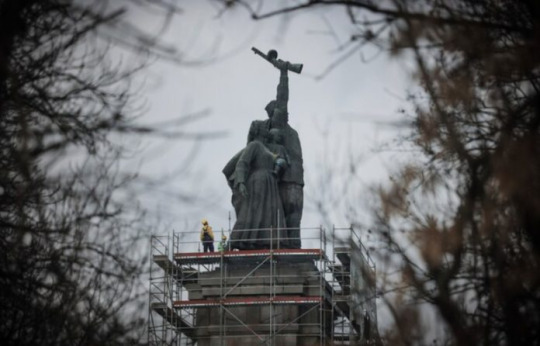
#world news#world politics#news#europe#european news#bulgaria#balkans#parliament#soviet union#soviet art#ussr
2 notes
·
View notes
Text
ART ABANDONED, ART RESTORED.


[Buckingsim Palace, Windenburg]
Alfred Culpepper [Estate Manager]: I’ll sign for it. This should have been delivered to the side entrance. How did you get past the bollards? Were they lowered? What company are you with again?
[Delivery Guy]: Umm, FedSim. Print and sign right here, sir.
Alfred: Do you know where you are, young man? This is Buckingsim Palace!
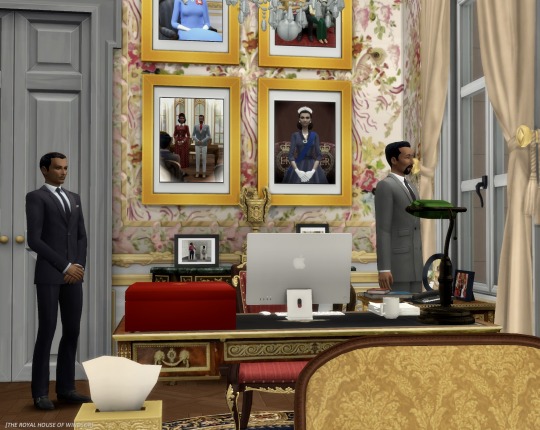
Alfred: “No, No, No! You can't just walk through The Grand Entrance, you incompetent fools! Stop!”
King George: Oh, Alfred! He runs a tight ship!
Martin Lavelle [Private Secretary]: What was that, Your Majesty?
King George: Nothing!
Martin: The Prime Minister is on line 3, sir.

King George: Hello, Prime Minister.
Linwood Keller [PM]: “Your Majesty. Cabinet and the Executive Branch sends The Queen consort our congratulations on her victory at the Supreme Court.”
King George: Sure, sure. Thank you.
Linwood Keller [PM]: “As you know, a negative outcome would have had adverse affects on government and the economy. A scandal of this magnitude, so close to the Crown, can't happen again! With scrutiny on the royal family at an all time high, Cabinet will be reviewing the Sovereign Grant’s budget during our first session of the new year.”
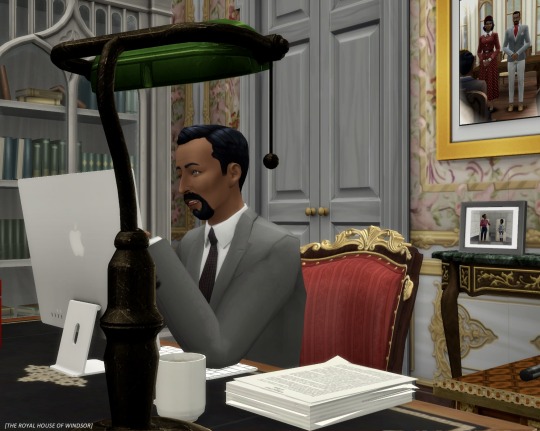
King George: If you think I'm going to approve Parliament cutting more money from the Sovereign Grant, you’re wrong!
Linwood Keller [PM]: “With all due respect, Your Majesty, I have the House votes to amend the Sovereign Grant Act, if I choose. This isn't up for discussion. This was just a courtesy call that a budget review was forthcoming. Good day, sir.”
[Call drops]
King George: Prime Minister?

King George: *shocked* I think the Prime Minister just hung up on me!
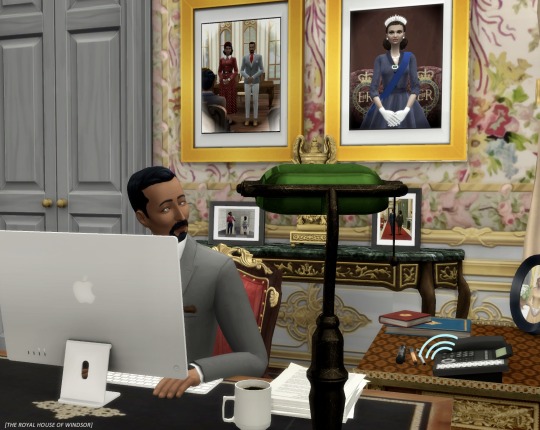
King George: Martin, are you there?
Martin: “Yes, Your Majesty.”
King George: Good. Tell the Keeper of the Privy Purse I want to see him NOW!
Martin: “Yes, Your Majesty. Also, the Grand Duchess of Glimmerbrook sent you a gift. It is in the Bow Room. The delivery note said to call her upon viewing the gift, sir. Don't forget, your next royal audience is in 15 minutes.”
King George: Thank you, Martin.

[Bow Room]
King George: It’s a painting of Queen Isabella. One I’ve never seen before. She’s... OLD! I’ve never seen a portrait of her this age!
Grand Duchess Kamill: “It was commissioned around 1829. She’s also sitting! She never sat in portraits. That’s not what’s significant though. Do you notice anything else?”

King George: *shocked* The Amulet of Amethyst! Wait! How did you get this portrait?
Grand Duchess Kamill: “I’ve been busy the last four weeks! Will Gates deciphered the journal! It led me to an abandoned church in Franklin, San Myshuno where I found this portrait in the basement, which I am now gifting to you. My great-grandmother hid the Amulet of Amethyst with the one person no-one would ever suspect, her grandmother, Queen Isabella!”

King George: Queen Isabella had a secret relationship with the spellcaster granddaughter she forced her daughter to abandon!?
Grand Duchess Kamill: “Queen Isabella always felt guilty for making Princess Catherine give up her daughter so she had spies keep an eye on the child. In her journal, my great-grandmother recounted meeting Isabella for the first time when she was in her 20s and how the pair formed a secret grandmother-granddaughter bond.”

King George: Wait, you said the portrait was hidden at a church in Franklin, San Myshuno. Mayfield Castle is also in Franklin! Queen Isabella purchased that castle around 1790!
Grand Duchess Kamill: “This is the last known image of the Amulet and it was in the possession of Queen Isabella around 1829! So after my great-grandmother died, Queen Isabella received the Amulet. She took this portrait for a reason; to secretly honor her granddaughter and give us a clue in finding the Amulet. Has it been hiding within the Crown Jewels vault all this time!?”
King George: Queen Isabella didn't hide the Amulet of Amethyst within the Royal Collection. I would know! Where could it be? Thank you for the portrait, Grand Duchess! It seems I’ve got some research on my end to do now! Goodbye.
Previous | Beginning | Next
#Part 2#ts4 story#TS4#Amulet of Amethyst#ts4 simblr#ts4 royalty#the sims 4 story#ts4 royal simblr#sims 4 monarchy#the sims 4#sims 4 royal family#ts4 legacy#Queen Isabella had a secret#Anything for the simoleons#King George has another project#sims 4 story#ts4 tumblr#sims 4 royalty
11 notes
·
View notes
Text
So angry about the 1975 Australian constitutional crisis
OK basically Gough Whitlam (Labor party) was prime minister with a big majority in the house of representatives (67-58) but he couldn’t get anything done because the senate was mostly Liberal and the balance of power was with a conservative party. So this girlboss Gough Whitlam now can’t get any budget through to passing, which is very bad and very annoying for the Labor party. He calls an election where literally everyone in parliament is up for election (double dissolution) but Labor still doesn’t get a majority in the senate to pass things. As a result, Labor can’t get anything done, despite getting a majority of votes in both houses, and generally having a clear mandate from the people.
What Whitlam decides to do now is to do something completely unprecedented, and hold a joint session of parliament, where the senators and representatives all sit together and vote on shit, which HAS NEVER HAPPENED BEFORE OR AFTER THIS ONE TIME. They get some shit done, but it makes the Liberal party really angry.
Simultaneous to all this, Whitlam appointed a new governor-general, John Kerr, who the Liberal party is suspiciously positive about.
Skipping over a bunch of politics, the opposition leader Malcolm Fraser does some scheming with John Kerr, and so John Kerr fucking just says “oh well okay Gough Whitlam can’t do the job of the Prime Minister well enough anymore let’s just get rid of him and now Malcolm Fraser is the Prime Minister” LIKE WHAT THE FUCK?
The fucking thing that made his happen was that the government couldn’t get a budget passed, because the Liberal party (who had the same number of seats as Labor in the senate (29)) just didn’t vote for it to pass and so Labor couldn’t get anything done. It’s basically the same thing as what happens in the US with a government shutdown BUT THEY FIRED THE FUCKING PRIME MINISTER
imagine that the republicans win this year’s midterms, and then if they don’t pass a budget that Biden will sign, they can just fucking get rid of the president and pick anyone else to be president. This was not a fucking democratic process it was corrupt as fuck
I am very angry over this despite it being 47 years ago
#also it came right after the menzies holt era#so there was like 3 years of Labor rule and they didn't get anything done
3 notes
·
View notes
Link
0 notes
Text
ParliamentBudgetSession : खरगे के
‘काले टीके’ पर PM मोदी ने कसा तंज कहा- ‘काले टीके से प्रगति को नजर नहीं लगती है…’
#mallikarjunkharge #narendramodi #icnewsnetwork #INCIndia #BJP4India
0 notes
Text
वित्त मंत्रालय का 'अर्थशास्त्री' समझाएगा Budget की गूढ़ बातें, 22 जनवरी से सोशल मीडिया पर लगेगी क्लास
वित्त मंत्रालय का ‘अर्थशास्त्री’ समझाएगा Budget की गूढ़ बातें, 22 जनवरी से सोशल मीडिया पर लगेगी क्लास
अगर आपको बजट (Budget 2020-21) की गूढ़ बातें समझ में नहीं आतीं तो परेशान होने की जरूरत नहीं है, इसके लिए वित्त मंत्रालय 22 जनवरी से सोशल मीडिया पर एक अभियान शुरू करने जा रहा है। मंत्रालय, #ArthShastri (#अर्थशास्त्री) अभियान के तहत बजट में इस्तेमाल होने वाली विभिन्न आर्थिक शब्दावलियों को आकर्षक एनिमेशन की मदद से आम आदमी और छात्रों को समझाएगा। इससे उन्हें समूची बजट प्रक्रिया को सरल तरीके से समझने…
View On WordPress
# union budget 2020#Animation#ArthShastri#Budget 2020#budget 2020 analysis#budget 2020 date India#budget 2020 expectations#budget 2020 expectations India#Budget 2020 Highlights#budget 2020 income tax#budget 2020 india#budget 2020 key points#Budget 2020 News#budget 2020 predictions#budget analysis#Budget news#budget report#budget session 2020#budget session 2020 parliament#budget speech#budget updates#Finance Budget#Finance Minister Nirmala Sitharaman#FM Nirmala Sitharaman#General Budget#government budget#Hindi News#Hindustan#income tax calculator#income tax slab 2020-21
0 notes
Photo
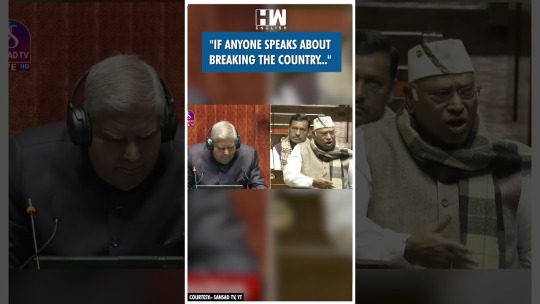
#Shorts | "If anyone speaks about breaking the country..." | Rajya Sabha | Budget Parliament Session
0 notes
Text
MEPs approved new fiscal rules for the EU during a plenary session on Tuesday despite an ongoing campaign by trade unions to prevent "austerity 2.0" from passing through.
"This reform constitutes a fresh start and a return to fiscal responsibility," said co-rapporteur Makrus Ferber (EPP – Germany). "The new framework will be simpler, more predictable and more pragmatic. However, the new rules can only become a success if properly implemented by the Commission."
The regulation passed with 359 votes in favour, 166 against and 61 abstentions, with conservatives, liberals and socialist groups helping to get the text over the line.
Advocates of the reform say it heralds a return to fiscal control after a more lax approach during the Covid-19 pandemic. Member States will now be required to keep budget deficits at less than 3% of national GDP. In addition, countries with excessive debt will be required to reduce it on average by 1% per year if their debt is above 90% of GDP, and by 0.5% per year on average if it is between 60% and 90%.
'Straitjacket'
European and Belgian trade unions have led a long campaign denouncing the reforms as a "Europe-wide return to austerity".
According to ETUC General Secretary Esther Lynch, 18 Member States including Germany, France, Italy, Spain and Poland would be unable to meet the required minimum level of investment in housing, healthcare and education under the new rules. In addition, only three Member States – Sweden, Ireland and Denmark – will be able to meet the social and climate investments required of them.
"This agreement, forced by the austerity approach of some European capitals, will require member states to reduce their debts rapidly and in ways that are economically and socially unsustainable," ETUC stated on the eve of the vote. "This will mark a return to austerity. At the same time, the new rules will also act as a disincentive to invest towards the social and climate objectives EU member states have agreed upon, by limiting the marge of manoeuvre of public deficit."
Similarly, Belgian MEP and President of the European Greens/EFA group Philippe Lamberts (Ecolo) drew attention to the social and environmental cost of tighter economic measures. "These new budgetary rules will impose a straitjacket on all EU Member States," he said on Monday. "It will deprive governments of the financial resources needed to guarantee a thriving economy, social services and climate action."
Other political groups in the European Parliament acknowledge that the reforms are imperfect, but necessary nonetheless. "There is no doubt that this deal is much better than no deal and going back to the old rules or having no rules at all," said co-rapporteur Margarida Marques (S&D – Portugal).
Right-wing and far-right political groups welcome a more stringent approach to EU budgetary rules. "There are a number of Member States who have gone too far in debt financing and this is a potential danger which can't be justified nationally or EU-wide," said MEP Johan Van Overtveldt (ECR/N-VA – Belgium). This echoes positions of "frugal" countries such as Germany, who fear another bail-out in the worst-case scenario.
Tax the rich
Tuesday's vote has not stopped the opposition campaign in its tracks. ETUC, the trade union leading the fight, has now emphasised the need to "tax the rich" as a solution to the EU's budgetary difficulties.
"Working people who have suffered a historic drop in living standards as a result of the pandemic and cost-of-living crisis simply don’t have anything left for politicians to take," stated Lynch in a press release published in the wake of the vote. "Instead politicians who supported these fiscal rules should have the decency to meet them through taxes on the corporations which registered record breaking profits which fueled inflation."
The vote on the budgetary reforms is one of almost 90 to take place during the Strasbourg plenary this week. This is the last time MEPs will convene before the end of the mandate and there is a palpable sense of urgency to deliver to voters before European elections on 9 June.
3 notes
·
View notes
Text
Navigating Growth and Inclusion: Insights from India's Interim Budget 2024-25
In an eagerly awaited budget session, Union Finance Minister Nirmala Sitharaman took center stage to present the Interim Budget for the fiscal year 2024-25 at Parliament. Her address not only provided a comprehensive overview of the government's achievements, fiscal targets, and strategic focus areas but also offered valuable insights into the nation's economic direction. Significantly, this budget goes beyond a mere financial plan; it serves as a testament to the government's commitment to inclusive development and its ability to navigate challenges with resilience.
The Economic Trajectory and Strategic Focus
Sitharaman's presentation skillfully outlined the trajectory of the nation's economy, emphasizing key milestones achieved in the past decade. The strategic focus on inclusive development, economic reforms, and the government's ability to steer through challenges were highlighted as cornerstones of the fiscal plan.
The Finance Minister revealed a reduction in the estimated gross borrowing for FY25, setting the stage for fiscal prudence. Notably, the fiscal deficit target for FY25 was declared at 5.1%, surpassing initial expectations and demonstrating an aggressive fiscal consolidation approach. Sitharaman also announced the withdrawal of outstanding disputed tax demands, a move expected to benefit approximately 1 crore taxpayers.
Taxation and Economic Measures
While maintaining the existing tax slabs in the Interim Budget 2024, Sitharaman provided continuity for certain benefits, including tax exemptions for specific IFSC units, extending them till March 2025. This calculated approach aims to sustain economic momentum while fostering a conducive environment for startups and businesses.
One pivotal aspect of the budget speech was the acknowledgment of research's role in bolstering indigenous oilseeds, contributing significantly to India's self-sufficiency. Sitharaman shed light on the fact that India annually spends over ₹1.5 trillion on importing 60% of its cooking oil, emphasizing the need for self-reliance in this crucial sector.
Also Read: What Is RBI’s Stance On Unsecured Loans?
Commitment to Inclusive Development
In her address, Sitharaman reaffirmed the government's commitment to the 'Sabka Sath Sabka Vikas' philosophy, underscoring policies that promote secularism, reduce corruption, and prevent nepotism. The comprehensive approach targeted the welfare of diverse segments of society, including the poor, women, youth, and farmers.
The budget also showcased impressive inclusive development initiatives, including direct benefit transfers amounting to Rs. 34 lakh crore into PM-Jan Dhan accounts. Success stories of schemes like PM-SVANidhi, PM-JANMAN Yojana, and PM-Vishwakarma Yojana further illustrated the government's commitment to uplifting various sectors of the population.
Agricultural sector achievements took center stage, with notable programs like PM-Kisan Samman Yojana and PM-Fasal Bima Yojana providing financial assistance to millions of farmers. The integration of 1,361 Mandis through the Electronic National Agricultural Market marked a transformative step in creating a more efficient and transparent agricultural ecosystem.
Also Read: How Can NBFCs Become Active Participants In The Payment Ecosystem?
Comprehensive GDP Approach
The budget speech also emphasized the Comprehensive GDP Approach, focusing on Governance, Development, and Performance. The macroeconomic stability, robust investments, and effective program delivery highlighted in this approach aim to fortify the nation's economic foundations.
In the realm of infrastructure development, key initiatives such as GST, tax reforms, and strengthening the financial sector were acknowledged. The creation of gateways for global capital through initiatives like GIFT IFSC and Unified Regulatory Authority IFSCA were hailed for facilitating economic growth.
Industry Perspective

Industry leaders, including K. Paul Thomas of ESAF Small Finance Bank, Shailendra Singh of BOBCARD Limited, and Abhay Bhutada, MD of Poonawalla Fincorp, expressed positive sentiments about the budget. They applauded specific measures such as the focus on providing formal credit to MSMEs, empowering women and youth, and promoting economic sustainability.
Abhay Bhutada, in particular, highlighted the budget's role in promoting economic sustainability aligned with the 'Viksit Bharat by 2047' vision. The fiscal responsibility reflected in the 5.8% GDP fiscal deficit was commended, indicating a decisive step towards India's economic sustainability.
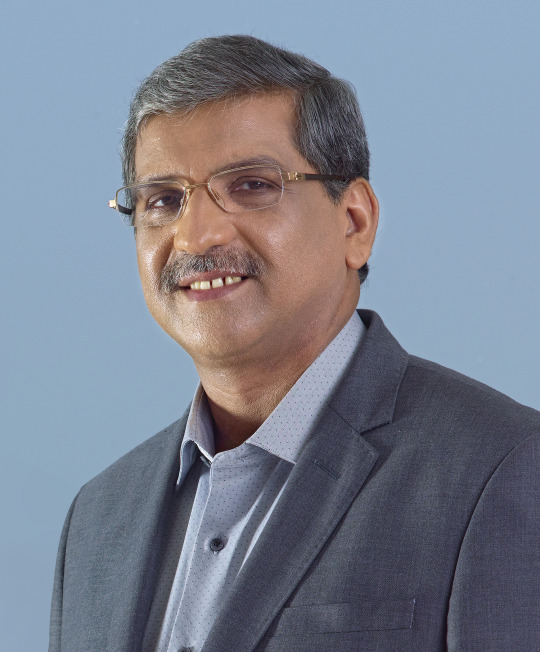
Also Read: Top Alumni From Pune's Symbiosis International University In The Field Of Finance
Looking Towards the Future
In conclusion, India's Interim Budget for 2024-25 not only addresses fiscal aspects but reflects a holistic vision for the nation's growth and development. By navigating challenges with resilience, emphasizing inclusive policies, and fostering economic sustainability, the government's budgetary approach sets a positive tone for India's future trajectory.
As the nation looks towards the future, the budget stands as a blueprint for sustained growth. The reduction in gross borrowing and the aggressive fiscal consolidation approach signify a commitment to financial prudence. The extension of benefits for startups, the continuation of tax exemptions, and the emphasis on self-sufficiency in cooking oil production point towards an environment conducive to economic expansion and innovation.
The success stories of inclusive development initiatives in the agricultural sector, direct benefit transfers, and transformative schemes demonstrate the government's commitment to addressing the needs of diverse segments of the population. The industry's positive response further underscores the potential for collaboration and growth in key sectors, including MSMEs, fintech, and digital lending.
Final Thoughts
As India forges ahead into the fiscal year 2024-25, the Interim Budget serves as a guidepost for progress. It not only outlines fiscal policies but also paints a comprehensive picture of a nation committed to inclusive development, economic resilience, and sustainable growth. The collaborative efforts of the government, industry, and citizens will play a pivotal role in realizing the vision laid out in this budget – a vision that propels India towards a prosperous and resilient future.
1 note
·
View note
Text
President’s Address Highlights The Vision Of India's Further Development In The Coming Years, says PM
On January 31st, in New Delhi, Prime Minister Narendra Modi talked about President Draupadi Murmu's recent speech, highlighting the collective strength of 1.4 billion Indians.
The Prime Minister posted on X:
“The Budget Session began with Rashtrapati Ji’s extensive and insightful address highlighting the collective strength of 140 crore Indians, seen in a series of feats our nation has achieved. The Address also highlighted the vision of fututr India in the coming years.”
President Droupadi Murmu outlined the government's priorities:
The leader mentioned that in 2023, our nation had a special year because it stayed the fastest-growing big economy.
President Droupadi Murmu outlined the government's priorities. Her talk is mainly about four important things: young people, women, farmers, and those who don't have much money.
President's address, held in the new parliament building:
Mint had previously reported on these pillars being central to the Union budget proposals. The President's address, held in the new parliament building, is significant preceding the budget presentation in the last session of the 17th Lok Sabha before the upcoming general elections later this year.
“My government believes the grand edifice of a developed India will stand on four strong pillars of youth power, women power, farmers, poor and so it is constantly working to strengthen these pillars. The government has spent a significant portion of the tax revenues to empower these pillars,"
'Garibi Hatao': Eradicate Poverty
President Murmu said. Referring to the 'Garibi Hatao' (Eradicate Poverty) slogan, President Murmu noted the ongoing massive-scale poverty eradication.
According to NITI Aayog, “Approximately 25 crore people have been lifted out of poverty in the last decade under the government's initiatives.”
'Nari Shakti': The power of women
Talking about 'Nari Shakti' or the power of women, a crucial aspect for India's progress by 2047, the President discussed the government's efforts to make women stronger.
This includes improving their roles in different areas like water, land, sky, and space while also helping them be more involved in the economy. President Droupadi Murmu, in her address during the opening day of the Budget session in New Delhi on January 31, outlined the government's key priorities: youth power, women power, farmers, and the poor.
The upcoming budget: Expectations:
The upcoming budget is expected to focus on these pillars, as reported by Mint. The President highlighted the importance of the year 2023, calling it a historic time when India remained the fastest-growing major economy.
The government's commitment to eradicating poverty was highlighted, with around 25 crore people lifted out of poverty in the last decade, as per NITI Aayog. Regarding 'Nari Shakti' (Women Power), the President mentioned efforts to strengthen women's roles in various fields and enhance their economic participation.
The government is also trying to help farmers make more money, giving special attention to over 10 crore small farmers in the country's farming plans.
India has done well in becoming a top digital country:
President Murmu pointed out that India has done well in becoming a top digital country, creating more chances for jobs, and planning a mission about smart machines for young people and new business chances.
The leader talked about lots of changes the government made in the last ten years, saying how both computer-based and real-world things are important for growing in the future.A big plan is being made to turn India into a well-off nation by 2047, with a five-year program and a 25-year roadmap.
The government is also trying to help small businesses, save more money for regular people, appreciate those who create wealth, and make a good environment for businesses in India.
The President talked about important plans for the economy:
The President talked about how government changes have been good for the economy, and helping it grow more, create more jobs, and reduce poverty.
Looking at different parts of the economy, the President feels sure that India has done well over the last ten years, going from being not so strong to being in the top group of countries, with exports, money from other countries, sales of local products, and the number of people filing income tax returns all going up.
She also mentioned plans like PLI schemes, Make in India, and Aatmanirbhar Bharat campaigns, along with laws like the GST legislation, the insolvency and bankruptcy code (IBC), not making corporate laws a criminal offense, and making it easier to do business.
0 notes
Text
Tunisia’s Saied wants to make the central bank fill the budget deficit
Tunisian President Kais Saied is preparing to seek direct financing for the government’s budget from the Central Bank of Tunisia in a move analysts say could worsen the financial difficulties the country has been experiencing since before its 2011 revolution.
Shortfalls in the budget have already resulted in the absence of state-subsidised goods like flour, rice and coffee from supermarket shelves as inflation pushes the prices of other goods beyond the reach of many households.
.adtnl2-container { display: flex; flex-direction: column; align-items: center; width: 100%; max-width: 600px; background-color: #fff; border: 1px solid #ddd; border-radius: 10px; overflow: hidden; box-shadow: 0 0 10px rgba(0, 0, 0, 0.1); margin: 20px auto; } .adtnl2-banner { width: 100%; max-height: 250px; overflow: hidden; } .adtnl2-banner a img { width: 100%; height: auto; max-height: 250px; } .adtnl2-content { width: 100%; padding: 20px; box-sizing: border-box; text-align: left; } .adtnl2-title a { font-size: 1.2em; font-weight: bold; margin-bottom: 10px; color: #333; } .adtnl2-description { font-size: 1.2em; color: #555; margin-bottom: 15px; } .adtnl2-learn-more-button { display: inline-block; padding: 10px 20px; font-size: 1.2em; font-weight: bold; text-decoration: none; background-color: #4CAF50; color: #fff; border-radius: 50px; /* Pill style border-radius */ transition: background-color 0.3s; border-color: #4CAF50; } .adtnl2-learn-more-button:hover { background-color: #45a049; } .adtnl2-marker { font-size: 0.8em; color: #888; margin-top: 10px; }
Dabiri-Erewa warns Nigerians against irregular migration, Especially to Canada
The Nigerians in Diaspora Commission (NiDCOM), Abike Dabiri-Erewa, has urged Nigerians travelling abroad to go legitimately and with proper documentation
Read Article
Ads by NSMEJ
With gaps in last year’s budget as well as a 10.6-billion-dinar (about $3.4bn) shortfall in the current year, the state is looking to compel the Central Bank to purchase government bonds as a way to raise direct funding.
Government proposals were discussed by the parliament’s finance committee on Wednesday with what are understood to be instructions to fast-track its passage to parliament next week, where it can be voted upon during its plenary session.
“Tunisia has run out of credit,” Hamza Meddeb of the Carnegie Middle East Center said. “Its negotiations for a further loan with the International Monetary Fund [IMF] appear stalled. There are no new payments coming from the European Union for its part in helping curb the flow of irregular migrants and no sign of financial help coming from elsewhere.
“Tunisia needs cash immediately. It can’t wait,” he said.
The legislation – if passed, as looks likely – would threaten the bank’s independence and, by devaluing its own currency, risks triggering a wave of inflation that its outgoing governor, Marouan Abassi, previously likened to that of Venezuela, where percentile increases in the cost of goods and services are now measured in the hundreds.
The Central Bank authorised a brief raid on its reserves in 2020 and released 2.8 billion dinars (roughly $900m) under exceptional legislation to help combat the spread of COVID-19. At the time, international bodies, including the IMF were happy to waive the implications of the move, given circumstances that were, by any measure, unprecedented.
The Central Bank has remained a respected pillar of the Tunisian state, retaining broad control over interest rates, helping mitigate the worst effects of the country’s economic decline and proving vital in maintaining the confidence of international financial backers, such as the IMF and World Bank.
“Central banks … rely upon their independence,” economist, Aram Belhaj from the University of Carthage said.
In addition to their critical role in helping control inflation by setting interest rates, they also tie the hands of politicians, Belhaj explained.
“If you have politicians with unrestricted powers, they will use the central bank to finance expenditures, possibly funding electoral objectives. Therefore, the independence of the central bank is crucial. It effectively limits political pressure,” he said.
While the current legislation does not explicitly mark the end of the bank’s independence, it does undermine a 2016 law that separates the state from the central bank and is the subject of sporadic presidential criticism.
“The new legislation is not part of a broader approach that would allow the Central Bank to integrate [with the economy] or become more involved in growth and development issues,” Belhaj said.
“It’s just a modification that allows the government to obtain an advance of 7 billion Tunisian dinars [$2.24bn] – which is an incredibly large amount – to finance the budget deficit,” he said.
Tunisia had been in negotiations with the IMF for a further $1.9bn bailout. However, what looked to have been a finalised deal was rejected by Tunisia in April when Saied rejected the body’s “foreign diktats” intended to curb spending on subsidies and government salaries – said to be, per capita, among the highest in the world.
“This speaks as much about desperation as anything else. It tells us that the state didn’t have any other options. They needed capital, and they needed it immediately. All other options would have required negotiations and time,” Meddeb said.
“Moreover, we don’t even know which funds the government is drawing upon, and that’s critical. If it seeks to access the bank’s foreign reserves, it risks Tunisia’s devaluation of the dinar. If it accesses our domestic reserves, we’re essentially printing our own money to pay our bills.
“Neither makes Tunisia a particularly attractive option to investors or backers.”
.adtnl2-container { display: flex; flex-direction: column; align-items: center; width: 100%; max-width: 600px; background-color: #fff; border: 1px solid #ddd; border-radius: 10px; overflow: hidden; box-shadow: 0 0 10px rgba(0, 0, 0, 0.1); margin: 20px auto; } .adtnl2-banner { width: 100%; max-height: 250px; overflow: hidden; } .adtnl2-banner a img { width: 100%; height: auto; max-height: 250px; } .adtnl2-content { width: 100%; padding: 20px; box-sizing: border-box; text-align: left; } .adtnl2-title a { font-size: 1.2em; font-weight: bold; margin-bottom: 10px; color: #333; } .adtnl2-description { font-size: 1.2em; color: #555; margin-bottom: 15px; } .adtnl2-learn-more-button { display: inline-block; padding: 10px 20px; font-size: 1.2em; font-weight: bold; text-decoration: none; background-color: #4CAF50; color: #fff; border-radius: 50px; /* Pill style border-radius */ transition: background-color 0.3s; border-color: #4CAF50; } .adtnl2-learn-more-button:hover { background-color: #45a049; } .adtnl2-marker { font-size: 0.8em; color: #888; margin-top: 10px; }
Dabiri-Erewa warns Nigerians against irregular migration, Especially to Canada
The Nigerians in Diaspora Commission (NiDCOM), Abike Dabiri-Erewa, has urged Nigerians travelling abroad to go legitimately and with proper documentation
Read Article
Ads by NSMEJ
0 notes
Text
10 Key Highlights of Interim Budget 2024-25; you should not miss
Finance Minister Nirmala Sitharaman delivered her Budget speech, presenting the Interim Budget 2024-25 at Parliament on Thursday, February 1, a day after the commencement of the Budget Session. Prime Minister Narendra Modi praised Nirmala Sitharaman for presenting a balanced budget. This was Nirmala Sitharaman’s sixth Union Budget. The full-fledged budget will be presented by the new government…

View On WordPress
0 notes